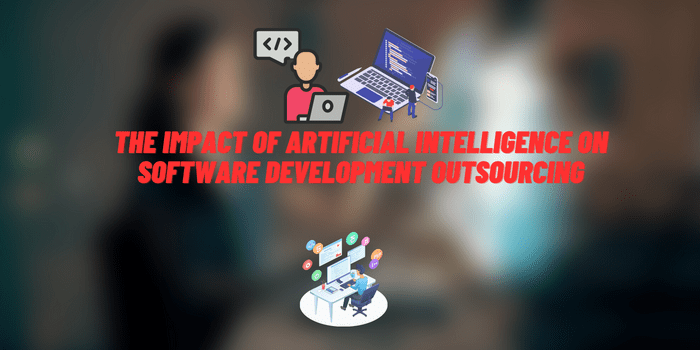The Impact of Artificial Intelligence on Software Development Outsourcing
Outsourcing software development refers to delegating development tasks to external software engineering companies, usually located in remote geographical locations. This approach has garnered significant popularity across a wide spectrum of industries and businesses of varying sizes, including both small and large enterprises. Organizations gain several competitive edges by collaborating with a reputable software development outsourcing company. Outsourcing development offers significant advantages, such as access to a vast global pool of talents and expertise in various technological domains and industries. This approach allows the in-house team to focus on core tasks, reducing overall project costs and speeding up the time-to-market.
In the software engineering domain, the potential of AI recruiting software to enhance and optimize various aspects of the software development lifecycle is immense. Its impact is far-reaching, especially regarding mundane tasks automation, project management, and QA. However, is it truly that straightforward? Let’s delve deeper into the subject, examining the transformative changes in the market and how it is reshaping our future right now.
What Does AI Mean in Software Development

Despite the hype around AI, especially after the recent release of ChatGPT, AI is rather a logical evolution of software development than a revolution. Newspapers were full of headlines about the future of software engineers that can be entirely replaced by “robotic AI” very soon. However, that will not happen, at least in the next 5-10 years, due to the following reasons.
Firstly, the moral question of personal responsibility arises, especially when it comes to errors and mistakes natural for human-being. Secondly, coding is not the only aspect of the developer’s job; most devs spend at least several hours per day just communicating with colleagues. Thirdly, AI is undoubtedly a very decent tool for writing code from scratch; however, it performs fairly worse when it comes to editing existing code, taking into account specific characteristics and circumstances of the particular project.
Although AI will likely not replace humans, it’s already a good developer assistant. Modern AI tools bring a myriad of opportunities in project management, testing, automation of repetitive tasks (e.g., generation of code, documentation, and data entry), web design, analytics, and many other aspects of the software development industry.
Benefits of Leveraging the Power of AI in the Software Development Industry

Incorporating AI offers a substantial boost in a multitude of spheres; it enhances efficiency and productivity. The development process can be streamlined with AI-based automation, eliminating recurring tasks and liberating valuable time for in-house devs for core and creative endeavors. It leads to optimized resource utilization and ultimately reduces the overall development period, allowing companies to deliver efficient solutions faster and stay at the cutting edge of the industry.
AI integration in the IT industry brings a wide range of additional benefits. Through harnessing AI power, companies can streamline development processes and minimize the likelihood of errors. Automating data processing, generations of on-the-shelf code chunks, as well as QA processes saves valuable time and effort.
Moreover, utilizing AI-driven technologies helps elevate the precision and effectiveness of software testing. AI-driven automated tools can analyze vast amounts of data, identify patterns, and detect potential issues or vulnerabilities during the testing stage. Doing so lessens the requirement for extensive manual testing and elevates the overall quality of the software. Regarding QA, minimizing human interventions yet maximizing the impact of AI, outsourcing companies can deliver robust and bug-free solutions for their clients.
Companies that embrace AI as a helpful development tool definitely gain a market advantage. Generally, they deliver more efficient and high-quality software solutions to clients just by adapting some of the most recent AI-driven tools. Speedier development cycles and decreased time-to-market for software solutions helps development services provider to minimize costs and, subsequently, become a more attractive choice for potential clients.
Future Trends and Implications

The rapid advancements in AI have significant implications for the future of outsourcing companies engaged in software development. These changes are expected to shape the industry and redefine the role of outsourcing in the software development landscape.
Firstly, AI is likely to drive more innovation regarding task automation. AI assistants and frameworks will automate repetitive and time-consuming activities even more, freeing up human developers to concentrate on sophisticated and long-term tasks. On the one hand, it increases performance; on the other hand, let’s be honest, almost no one likes to do routine work. Together with AI-based capabilities in project management, these factors would probably be mutually beneficial for the developers, companies, and their clients.
Secondly, there will be a growing emphasis on AI in DevOps and automated deployment spheres. Traditionally, software deployment and DevOps practices require careful coordination, manual configuration, and adherence to complex release pipelines. However, by leveraging AI&ML, development companies can introduce intelligent automation into these pipelines by providing robust tools for analyzing historical deployment data, identifying patterns, and optimizing deployment strategies. Additionally, AI will likely progress in detecting potential vulnerabilities and risks, proactively suggesting mitigation strategies to ensure smooth deployments, and simplifying the DevOps processes.
Additional Hurdles and Factors to Consider when Implementing AI in Development Lifecycle
The increased adoption of AI in software development raises concerns regarding the privacy and security of sensitive data, as well as the quality of source datasets. Such kind of tools rely heavily on data, including sensitive user information, which must be handled with utmost care. Regarding outsourcing companies, the question is even more pressing. Outsourcing companies need to ensure appropriate security measures while working with sensitive data to prevent breaches and misuse.
Additionally, different AI solutions often require interoperability with other tools, frameworks, and platforms, which can be quite challenging. Software development outsourcing companies need to invest in skilled professionals who can effectively navigate the integration challenges. The pilling up of various AI tools in the future may cause serious compatibility problems, requiring the implementation of appropriate solutions to ensure the smooth adaptation of each.
Conclusion
The impact of artificial intelligence on the software development landscape is significant and multifaceted. Although the integration of AI in the development lifecycle holds tremendous potential for driving innovation, efficiency, and competitiveness, there are still several potential problems the industry can face, including ethical issues and data security concerns. In this perspective, the prospects of AI in most digital spheres are promising, and most likely, the adaption of solutions based on AI is no longer an option for software development agencies. In fact, if you are thinking about creating your own software, the choice will look like a choice between two companies adapting AI in different ways rather than a choice between AI and “human developers.”






